General
Universities need to generate Entrepreneurs & Innovators – Ramathan Ggoobi, Permanent Secretary & Secretary to the Treasury
Published
3 years agoon
By
Mak Editor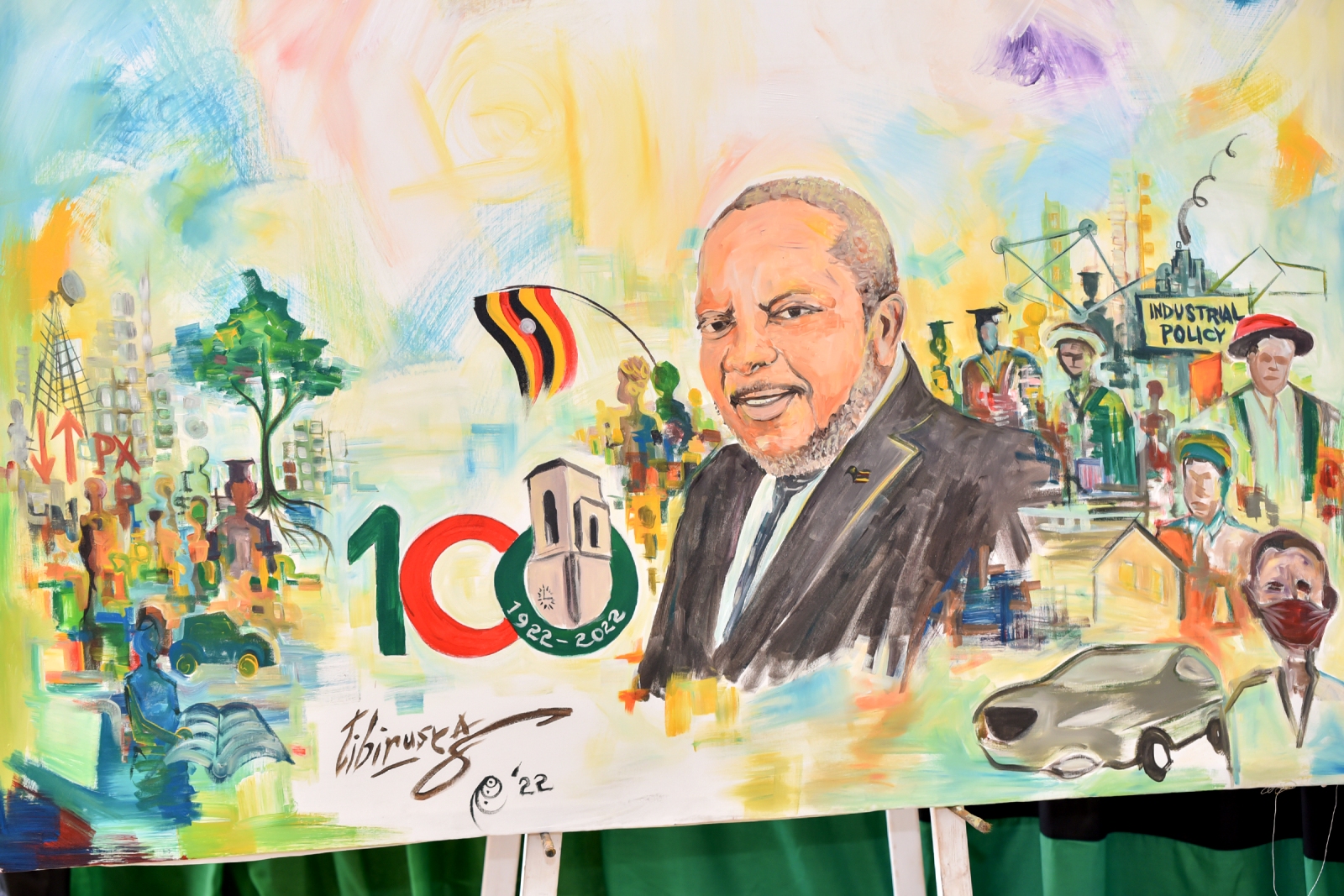
By Our Writer
Ggoobi said a young Mutebile was conscious enough to comprehend Amin’s economic distortions and human rights violations, and risked to oppose them. Yet, like many budding economists of the time, Mutebile started as a socialist. He quickly mutated into a liberal thinker and went on to help Uganda to get rid of economic distortions.
Universities should also play a key role in economic and social planning. Enterprise incubators and start-up support should be scaled to boost local job creation and competitiveness of small businesses, Ramathan Ggoobi the Permanent Secretary and Secretary to the Treasury in the Ministry of Finance, Planning and Economic Development Uganda has said.
Ggoobi also said as hosts for the country’s young generations, universities should think about practical ways of averting the growing boomerang generation—young adults who return to their parents’ home after university because they’ve failed to live on their own.
Delivering his keynote speech at the inaugural Tumusiime Mutebile Memorial Lecture under the theme, ‘Economic recovery and resilience in a post Covid-19 world-The role of Higher Institutions,’ Ggoobi said the key to economic recovery now is in the ability of our university to generate the kind of human resource that ultimately will translate into entrepreneurship and innovations
“Apart from promoting greater productivity and work efficiency, education is the primary opportunity equalizer. Probably the key to economic recovery is in the ability of our universities to generate the kind of human resource that ultimately will translate into entrepreneurship and innovations.
Ggoobi said during the pandemic Makerere set up a University Scientific Advisory Committee which was key in advising the Government.
“Universities need to relax a bit on the requirements – both academic and financial – to take on more students and reduce the dropout rate, one of the effects of the pandemic. Please do everything possible not to leave any student behind, particularly those who belong to the most vulnerable socioeconomic backgrounds. Remember, families are going through a very difficult time. So, develop timely, student-centric responses,” Ggoobi said.
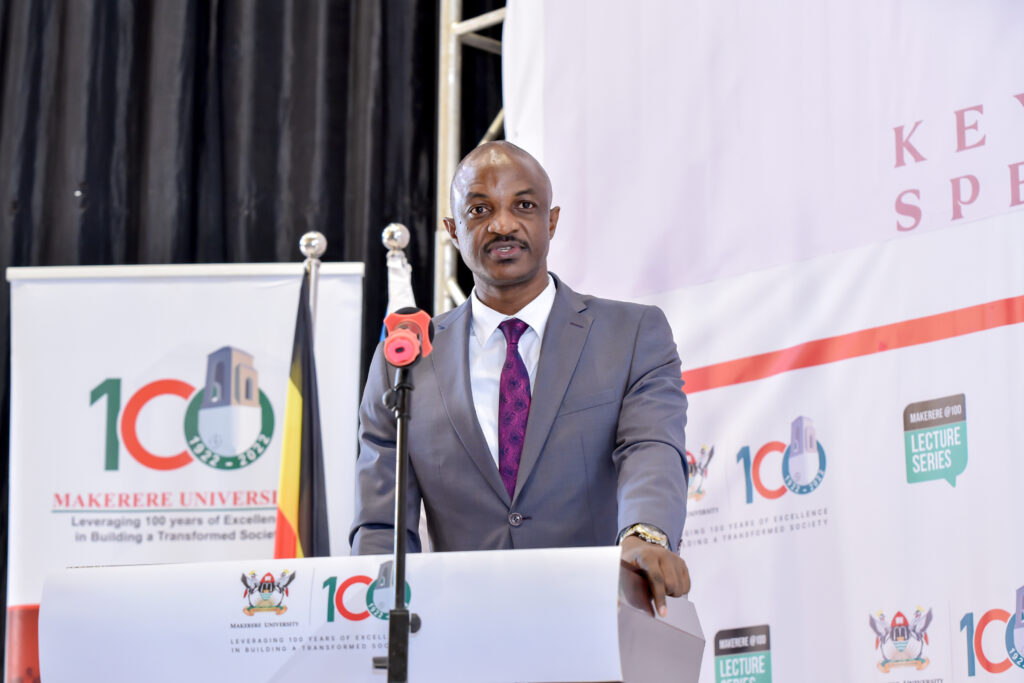
Ggoobi said as government, they were committed to continue enhancing funding for universities to support the transformation of higher education in the face of tectonic, long-term shifts in demographics, technology and competition. We shall invest more in online, hybrid and competency-based learning, improved infrastructure, student sponsorship, and most importantly research and innovation.
Ggoobi said that it was an immense pleasure to return to this intellectual powerhouse to honor one of the greatest economists and reformers of our time, and also to talk about economic recovery efforts.
“On behalf of the Ministry of Finance, Planning and Economic Development, and specifically the hundreds of fellow alumni of this great institution working in the Ministry, I am delighted to congratulate Makerere upon reaching 100 years of Building for the Future,” Ggoobi said.
Ggoobi said Makerere University was one of the world’s most prestigious universities. “Its alumni include world leaders, top notch intellectuals, leading business executives, and many other impactful human beings, both living and dead. I thank you for inviting me and enabling me to return to Makerere for the first time as the Secretary to the Treasury of the Republic of Uganda. I started my journey of training as an economist here,” he added.
Ggoobi noted that there were a number of things he was scheduled to do, “but I honestly can’t think of one that would make me happier and proud, than one for the promotion of economics. Until recently, my life’s work (my teaching, my research, my public writing, my community work, and even my twitter and Facebook posts) has been all about trying to demonstrate to fellow Ugandans what I learnt while in the gates of Makerere – that economics is not common sense per se.
Ggoobi said the Covid-19 pandemic had greatly affected the country and the entire world.
“In any case the entire world has been a laboratory and us all the specimens for its torment. From the anguish of losing our loved ones (a world total of 6.23 million souls – and still counting; of whom 3,597 were Ugandans) to a disrupted recovery and higher inflation, the pandemic has plagued the human race at unprecedented scale,”
Ggoobi noted that at its peak the global economic growth declined to minus 3.1 percent in 2020, from 2.9 percent in 2019. “In Uganda’s case, economic activity was cut by more than half. The services sector was most affected, in particular education, transport, hospitality and entertainment activities. The size of the labour force declined with many workers moving from modern and semi-modern sectors into subsistence agriculture.”
He also said the share of working persons in subsistence agriculture increased from 41% to 52% before and after the outbreak of the pandemic. “As we talk now, 6.8 million people (housed in 3.5 million homes) are in subsistence. We have also experienced revenue shortfalls in the past two years yet expenditure needs increased to finance the fight against Covid-19, enforcement of Covid-19 SOPs to keep Ugandans alive.”
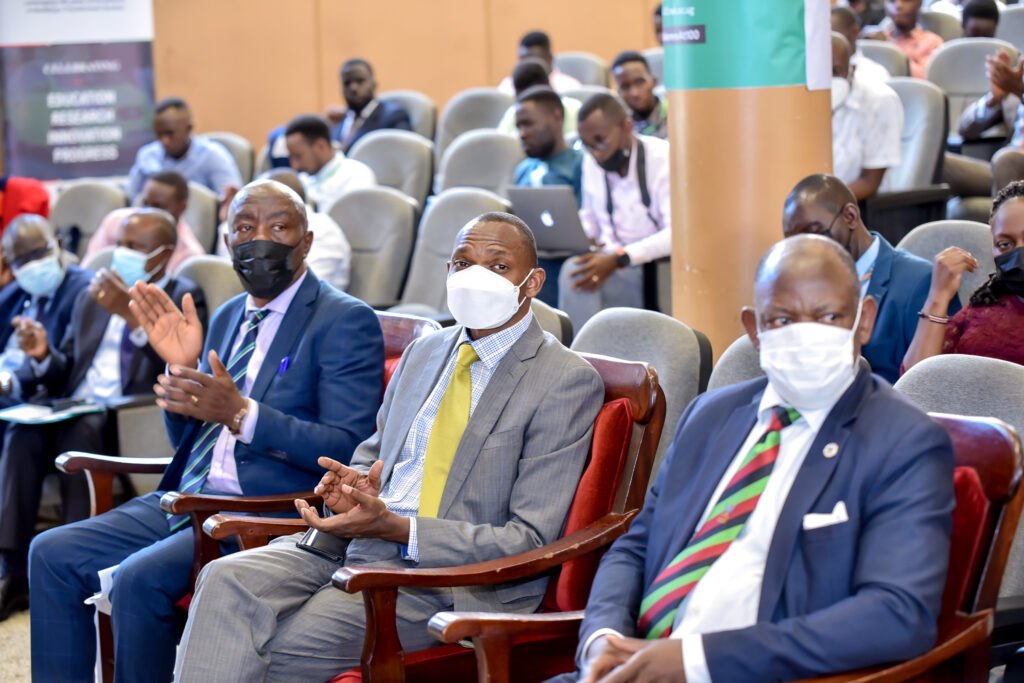
On commodity prices, Ggoobi said, “Economists know that it takes time for external shock to manifest themselves. In this case, they have started with prices of essential items, particularly laundry bar soap, fuel, cooking oil, building materials like cement and steel, some food items, and education services.”
He admitted that these had significantly increased in recent months. “As a result, inflation has risen to 3.7% in March 2022. The causes are largely external and supply-side related, key of which is the effect of Covid-19 restrictions which disrupted supply-chains worldwide leading to higher transport costs, shortage of shipping containers, shortage of raw materials, and higher fuel prices. This cocktail has curtailed smooth manufacturing/production and movement of goods and services, leading to increased commodity prices.”
He also attributed the increase in prices to the full opening of economies globally and the Russia-Ukraine war “After Covid had lessened, it led to a swift rise in aggregate demand for a number of goods and services such as fuel, transport, education etc. This has further increased prices. Since crises are like taxis; another one is often the way as one leaves the stage, the Russia-Ukraine conflict emerged as Covid left the stage and has further disrupted supply of goods such as oil, wheat, maize, and sunflower oil, as well as raw materials. The two countries are major producers and exporters of these commodities.
On what the Government was doing, Ggoobi said the causes of the current spike in prices were as a result of; Supply related; External; and Global. “Government policy response, therefore, must focus on addressing the supply constraints most of which are external and affecting the entire world. Anything else implemented would be a wrong medicine to a known ailment.”
He outlined some of the measures being undertaken by the Government to include; “Ensuring that we maintain a competitive environment to support a continuous supply of the goods and services whose stream is currently constrained – that is, fuel, soap, cooking oil, cement, steel, etc.- and avoid creating more shortages. We cannot afford to make demand outstrip supply. Most of the things some people want us to do are good common sense but very bad economics.”
Ggoobi also noted that they were supporting farmers to grow more food to ensure we do not suffer food shortages since food is the main driver of Uganda’s inflation.
“We are also facilitating more exports to take advantage of the shocks, and earn more foreign exchange to pay for the now expensive imports.
On what Mutebile would have done had he still been around, Ggoobi noted Mutebile was the grandfather of the economy we have today.
“Mutebile liberated Uganda from the ‘control model’—the practice of using administrative controls to keep the prices low and revaluing the shilling to make imports cheap. Beginning in 1966 the State of Uganda had assumed a lead in all the major economic activities. The leaders then and the people they led thought this was the best way of ensuring making the economy work for everyone,” Ggoobi said.
He said in 1969, in the bid to enable indigenous Ugandans to “have a say in the economic affairs of their country,” which at the time was dominated by Asians and British immigrants, and “for the realization of the real meaning of Independence”, President Apollo Obote announced a “Move to the Left”, culminating into the infamous 1970 Common Man’s Charter.
“This was the beginning of the control model in Uganda. When Idi Amin took power in 1971, economics was replaced by flawed common sense. As we heard in the numerous eulogies by his contemporaries, Prof Mutebile took the risk to remind the brash and unapprised Amin how economics works, and paid a huge price. Yet many Ugandans then considered him a nationalist.”
Ggoobi noted that even today, many Ugandans silently support Amin’s expulsion and expropriation of Asian property, price and foreign exchange controls and many other economic distortions.
“Generations of my students, none of whom was born by 1972 when Amin executed the economic war, as well as various groups of people I have taught Uganda’s economic history during my, often expressed support and silent admiration of Amin’s ‘nationalist credentials’”.
Ggoobi said a young Mutebile was conscious enough to comprehend Amin’s economic distortions and human rights violations, and risked to oppose them. Yet, like many budding economists of the time, Mutebile started as a socialist. He quickly mutated into a liberal thinker and went on to help Uganda to get rid of economic distortions.
He outlined some of the economic distortions Mutebile helped Uganda get rid of;
“First, Mutebile helped this country to get rid of price control. It resulted in an emergency of black markets (magendo) involving hoarding of basic groceries and other essential commodities.”
He also noted that Mutebile kicked out smuggling in Uganda. “Due to economic mismanagement, the past governments were unable to collect enough tax revenue to finance government expenditures. To deal with this challenge, the governments resorted to levying exorbitant import tariffs to raise revenue. The high tariffs forced traders to engage in smuggling,” Ggoobi said.
He further noted that Mutebile, “helped Uganda to stop printing money to finance budget deficits. The Bank of Uganda had been turned into a printing press for money. Consequently, inflation had galloped into triple digits.
Mutebile also saved Uganda from black markets. “These used to emerge as a result of fixed exchange rates. For example, the official exchange rate in 1986 was fixed at sh14 and sh50 per US dollar for essential and non-essential imports respectively. Fixing of the exchange rate led to shortage of foreign exchange and emergence of black markets (the Kibanda market) for foreign currencies. International trade was severely affected leading to a shortage of imported goods and services.
Ggoobi also said, Mutebile helped Uganda to restore fiscal discipline. “He re-established the discipline of government, maintaining a fiscal position that is consistent with macroeconomic stability and sustained economic growth. Government avoided excessive borrowing and debt accumulation; committed more spending of the national budget on productive activities in the economy.
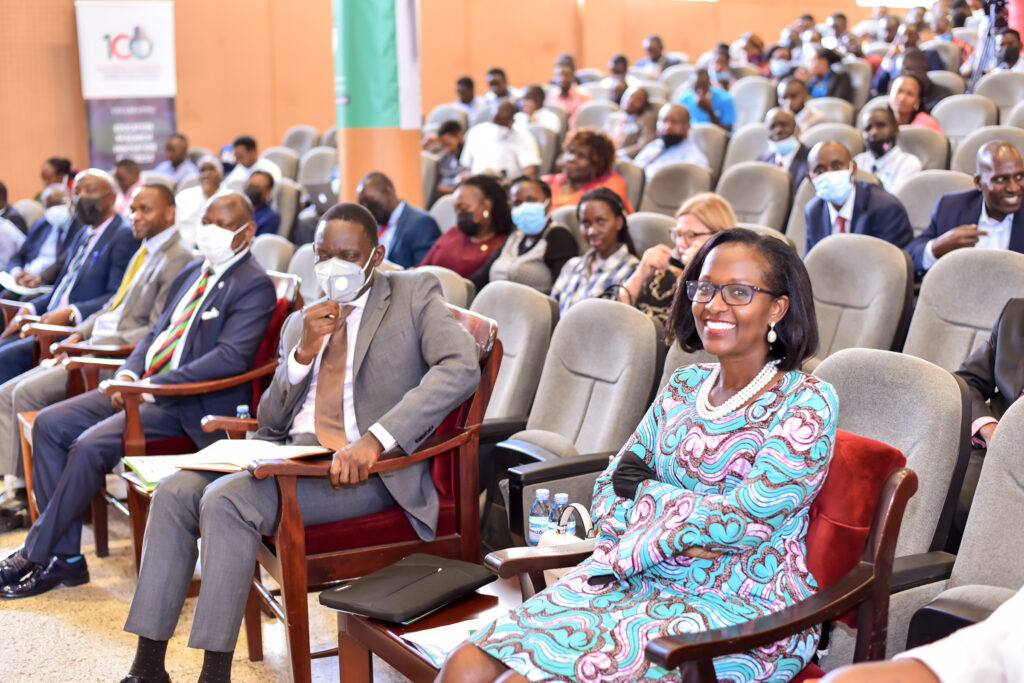
“It was Mutebile who masterminded the merger of the Ministry of Finance (MoF) with the Ministry of Planning and Economic Development (MoPED) in March 1992. This improved coordination of macroeconomic management. Within one fiscal year, inflation reduced from 54.5% in 1992/93 to 5.1% in 1993/94,” Ggoobi said.
Ggoobi further said that as pioneer PS/ST, Mutebile implemented three basic principles: Prudence by ensuring that expenditure by government was in line with revenue, and limiting borrowing strictly to necessary needs; Sustainability insisting no expenditure commitments that couldn’t be sustained over the medium and long term; and Consistency: all expenditures in line with the government’s long-term goal of building an independent, integrated and self-sustaining economy.
Ggoobi said Mutebile jealously defended the independence and authority of BoU over monetary policy (BoU Act); regulation and supervision of banks (FIA); and performance of its functions without subjecting it to the direction or control of any person or authority (Constitution). This transformed the bank into a credible institution with the prime objective of maintaining price stability.
“Mutebile led the crusade of private sector development to reduce government and its inefficiencies in doing business. All these reforms enabled Uganda recover and sustain growth at an impressive average annual rate of over 6.5% per year; maintained single-digit inflation averaging 5% for much of the period Mutebile was in charge at the Treasury and BoU; and facilitated poverty reduction from 56% in 1992 to 19.7% in 2014.
He also talked about the unfinished business Mutebile would want us to address saying the Government was now focused on the unfinished business not only to maintain Mutebile’s legacy but to propel Uganda to the level he and all of us want it to get to.
“In the medium term our efforts and resources will be concentrated on addressing the following: A large subsistence economy that has crippled household incomes and the purchasing power of the population; High unemployment and underemployment of the young people; High cost of credit, electricity and transport, which lower competitiveness of Ugandan products in regional and international markets; Low investment in scientific research and development to inform innovation and policy.
He also noted that they would focus on; Low level of industrialization; Land ownership and security, land use and land fragmentation; High levels of corruption in government and private sector; Limited export markets; and Quality of healthcare and education services.
The Tumusiime Mutebile Public Lecture will be an annual event which will serve as an intellectual rallying point for scholars, students and the general public by drawing eminent scholars and government representatives from across Africa and the globe in intellectual conversation and discourse that will proffer solutions to crucial issues in building a recovering and resilient economy in Uganda.
You may like
-


Simplicity, Service & Scholarship: Hallmarks of Professor Livingstone Luboobi’s Legacy
-


EfD-Mak Holds 2nd Advisory Board Meeting: Charts Path for Growth
-


Ugandan Study Flags Girls and Senior Students as a Mental Health High-Risk Group
-
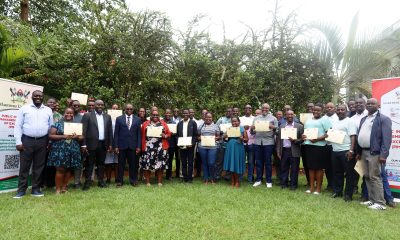

Makerere’s PIM Centre Concludes Training on Certificate of Financial Implications (CFI)
-
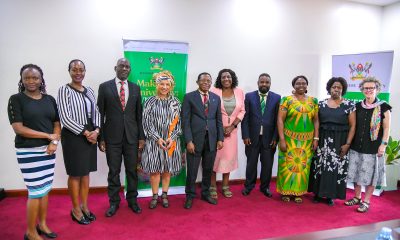

Mak, HERS-EA Discuss Nurturing More Women Leaders
-
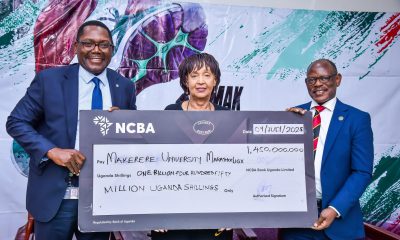

Thank You NCBA
General
Simplicity, Service & Scholarship: Hallmarks of Professor Livingstone Luboobi’s Legacy
Published
9 hours agoon
July 18, 2025By
Eve Nakyanzi
On Wednesday 16th July 2025, Makerere University lost one of its most cherished sons, Professor Livingstone Sserwadda Luboobi. Described as a mathematician, academic leader, and humble servant, Professor Luboobi devoted more than five decades to the university, rising through the ranks to become Vice Chancellor, and leaving a legacy defined by simplicity, service, and scholarship.
Born to Lameka Serwadda and Sanyu Serwadda on 25th December 1944 in Mitondo, Kalisizo, Kyotera District, Professor Luboobi’s academic career begun as a third-year student at Makerere and continued with unwavering loyalty until his passing. His life’s work reflected not only a commitment to mathematics but also nurturing generations of scholars and leaders across Uganda and beyond.
A funeral service was held in his honour at St. Francis Chapel, Makerere University on 18th July 2025. It was a moment of solemn remembrance and heartfelt tribute. Rev. Canon Dr. John Senyonyi delivered the sermon titled “Only God Knows,” reminding mourners of the mystery and grace of life’s journey. Rev. Canon Geoffrey Byarugaba represented the Kampala Diocese at the service, while former St. Francis Chaplain, Rev. Dr. Canon Johnson Ebong thanked Professor Luboobi for spearheading the Chapel’s expansion. Friends, colleagues, and family members filled the chapel, joined in mourning but also in gratitude for a life that had deeply touched theirs.

Mrs. Lorna Magara, Chairperson of the University Council, spoke movingly about Professor Luboobi’s faithfulness, likening his life to the biblical call in Mark 10:43, “Whoever wants to become great among you must be your servant.”
In his condolence message, the Vice Chancellor, Professor Barnabas Nawangwe, hailed Professor Luboobi as a visionary leader whose legacy is deeply woven into Makerere’s identity as a research-led institution. He credited Professor Luboobi with laying the groundwork for a culture of inquiry—championing graduate programmes, encouraging doctoral training, and fostering international collaborations that strengthened the university’s research profile. “He believed in building systems, not just structures,” noting that many of Makerere’s current research policies stem from his leadership. Even in retirement, Professor Luboobi remained a source of wisdom and guidance, quietly shaping the future of the university he so deeply loved.
Speaker after speaker painted a portrait of a man who led not by pomp, but by quiet strength and deep conviction. The Principal, Professor Winston Tumps Ireeta, speaking on behalf of the College of Natural Sciences (CoNAS), described Professor Luboobi as a foundational figure whose influence is deeply etched in the structures and spirit of the college. He spoke with emotion about Luboobi’s unwavering commitment to academic integrity and his belief in the power of mentorship.

“He was not just a mathematician,” Professor Ireeta said, “he was a visionary who understood the soul of the university. Even in retirement, he remained an advisor, a guide, and a quiet force of wisdom.” He concluded by saying that the college would continue to draw from his example as it navigates the future of science and innovation in Uganda.
Professor Luboobi’s illustrious career at Makerere University included serving as Head, Department of Mathematics from 1990 to 1991. The current Head of Department, Dr. Ismail Mirumbe remembered him as a pillar in the teaching and development of mathematics in Uganda
Professor John Mango, who served as Head, Department of Mathematics during Professor Luboobi’s term as Vice Chancellor from 2004 to 2009 described him as a towering figure of integrity and principle, someone who not only upheld the highest standards of academic conduct but insisted that others around him do the same. “He was a pillar in the department,” Prof. Mango remarked, “and his moral compass was unwavering.”

He recalled instances where Professor Luboobi made firm decisions, including terminating contracts when integrity was compromised, setting a tone that shaped the department’s reputation for honesty and excellence. Even as Vice Chancellor, he remained deeply involved in the department’s affairs, teaching, supervising students, all the while handling top administrative duties punctually. Prof. Mango spoke with great admiration of a man who led by example, mentored many, and whose contributions to mathematics education, research, and policy-making continue to shape the future of the discipline in Uganda and beyond.
According to an article from 1990 written by Dr. Vincent Ssembatya and Andrew Vince at the University of Florida, the Uganda Mathematical Society (UMS), which was formally established on 25th November, 1972 has since inception enjoyed major support from Makerere University and Kyambogo University in terms of infrastructure and leadership. Professor Paul Mugambi, who was also present at Professor Luboobi’s funeral service was elected first president of the UMS. Dr. Saul Nsubuga from the Department of Mathematics represented UMS at the service, honouring Professor Luboobi’s pioneering role in the discipline.
The service also featured tributes from close friends and family. Loved ones shared stories of a man who remained grounded no matter how high he rose, a man who valued relationships and walked closely with his faith. His children and grandchildren remembered him as a father who was ever-present, a listener, and a source of steady guidance.

Professor Daniel Kibuule, son of the late Professor Luboobi and Dean, Faculty of Health Sciences at Busitema University, delivered a deeply personal tribute that painted a full portrait of his father’s life, values, and final days. He expressed gratitude to the University leadership, family, friends, and medical professionals who stood with them during a challenging period. He particularly thanked his siblings, Dr. David Kimera and Dr. Irene Nakiyimba for their unwavering role in caring for Professor Luboobi through illness.
He spoke of a man who, despite great academic accolades, remained deeply humble and committed to discipline, simplicity, and faith. From instilling punctuality and responsibility to ensuring his children charted their own paths, none bearing his surname “Luboobi”, Prof. Luboobi was intentional in every lesson he passed on. Kibuule recalled his father’s insistence on being at home even in his final moments, his strong connection to Christ, and his quiet strength despite his failing health.
Former students and mentees echoed the same sentiments, of a teacher who was generous with his time and invested deeply in others’ growth. The community that gathered was not only there to grieve but to celebrate the quiet legacy of a man whose example continues to live on.
Among the mourners were public figures and leaders, including Hon. Abed Bwanika, Member of Parliament for Kimanya-Kabonera, Hon. Nyombi Thembo, the Executive Director Uganda Communications Commission, and Hon. Dr. Ham-Mukasa Mulira, former Minister of ICT, among others.
In his passing, Makerere University has lost a pillar, but his life reminds us that greatness lies in consistency, in humility, and in service to others. Professor Luboobi’s memory will continue to live on in the minds he shaped, the systems he built, and the values he embodied. He ran his race with grace.
The Writer is a Volunteer in the Public Relations Office, Makerere University
Please click the embedded video below to view the service livestream
General
Public University Legal and Accounting Officers Trained on Governance and Compliance
Published
2 days agoon
July 17, 2025By
Eve Nakyanzi
Legal and accounting officers from public universities across Uganda have convened, for a high-level training workshop organized by Makerere University. The three-day training, taking place from July 16th to 18th, 2025, is aimed at strengthening legal frameworks, improving institutional governance, and ensuring compliance with public finance and procurement laws within higher education institutions.
Ms. Lorna Magara, Chairperson of the Makerere University Council and Guest of Honour at the opening session, commended the initiative as timely and necessary. She addressed the growing backlog of court cases affecting Makerere and other public universities and outlined measures already taken to mitigate legal risks. These include the establishment of a Legal Rules and Privileges Committee and the Directorate of Legal Affairs, part of a broader strategy to improve legal compliance and foster good governance.
Representing the Vice Chancellor, Prof. Winston Tumps – Ag. Deputy Vice Chancellor (Finance and Administration), described the training as both strategic and practical. “It is imperative that we learn from each other, especially in how we handle employee litigation and institutional legal risks,” he remarked. He added that the program is designed to promote experience-sharing across universities and enhance collective institutional growth.

In his address, Mr. Yusuf Kiranda, University Secretary at Makerere University, emphasized the urgent need for robust legal oversight and more effective case management mechanisms within public universities.
The training featured a keynote address by the Attorney General of Uganda, Hon. Kiryowa Kiwanuka, who provided critical insights into legal expectations for public institutions. He warned that failure to heed legal advice could result in personal liability for accounting officers, citing a precedent involving the Uganda Cancer Institute. “Universities must consult the Attorney General’s chambers before entering into major contractual obligations,” he advised, urging legal officers to document decisions meticulously as proper record-keeping forms the first line of defense in legal disputes.

Hon. Kiwanuka further discussed the government’s ongoing efforts to recentralize legal services to ensure alignment with the Attorney General’s office. He cautioned in-house counsel against becoming overly entangled in decision-making processes, stressing the need for objectivity. Other key issues he addressed included contract approvals, misuse of Memoranda of Understanding (MoUs), and lapses in procurement processes, particularly at the close of financial years.
Participants also benefited from insights by Hon. Justice Musa Ssekaana of the Court of Appeal, who offered an in-depth analysis of judicial review and its significance in promoting lawful, transparent university governance. He called on university legal officers to act with clarity, timeliness, and accountability.
Lady Justice Joyce Kavuma, Judge of the High Court, delivered a comprehensive presentation on dispute and claim management involving public universities. She addressed emerging trends in civil litigation, emphasizing the importance of due process, transparency, and clear communication in resolving employment, student, and contractual disputes. Drawing on real case examples, she urged institutions to strengthen internal systems, embrace participatory governance, and adopt regional best practices to minimize litigation and protect institutional reputation.

The training reflects a shared commitment among public universities to build a more accountable, legally sound, and strategically aligned higher education system in Uganda. Through peer learning and collaboration, participating institutions aim to reduce litigation, enhance institutional autonomy, and uphold the rule of law.
Participating universities include Makerere University, Kyambogo University, Mbarara University of Science and Technology, Busitema University, Mountains of the Moon University, and Lira University.
The training concludes on July 18th 2025, with sessions focusing on employment dispute management in public universities and the implications of recent PPDA Appeals Tribunal decisions on procurement and disposal practices within public entities.
General
Celebrating the Life of Prof. Livingstone Sserwadda Luboobi
Published
2 days agoon
July 17, 2025By
Mak Editor
A Visionary Leader, Seasoned Mathematician, & Humble Academician
It is with profound love and respect that we celebrate the life of Prof. Livingstone Sserwadda Luboobi, a distinguished scholar, transformative leader, and beloved Vice Chancellor Emeritus of Makerere University. His legacy is woven in the fabric of African higher education, marked by intellectual brilliance, unwavering commitment to academic excellence, and a life of selfless service.
A Life of Purpose and Vision
Prof. Luboobi was more than a mathematician. He was a visionary, whose work transcended equations and research papers. Serving as Vice Chancellor from 2004 to 2009, he led Makerere University through a critical period of growth and transformation. Under his guidance, the university expanded its reach, strengthened its academic rigor, and embraced innovation and reform. His calm demeanour and principled decision-making earned the admiration of students, faculty, and peers alike.
Prof. Luboobi was deeply committed to nurturing talent and fostering intellectual curiosity, leaving an indelible mark on the institution’s culture and future direction.
Beyond Uganda, Prof. Luboobi’s influence resonated across the global academic community. He was a passionate advocate for the transformative power of science and education, often speaking at international forums and collaborating on research that bridged continents and disciplines. His work helped elevate the profile of African scholarship on the world stage.
His legacy endures not only in the impressive body of work he left behind but also in the countless lives he touched – students, educators, and leaders who continue to draw inspiration from him.
Academic and Leadership Journey at Makerere University
An illustrious alumnus of Makerere University, Prof. Luboobi graduated with First Class Honours in Mathematics, laying the foundation for an extraordinary academic journey. He pursued further studies at the University of Toronto (MSc in Operations Research, 1971-72) and the University of Adelaide (PhD in Biomathematics, 1978–80). His scholarly journey spanned prestigious institutions worldwide, including UCLA, the University of Bergen, and the University of Dar es Salaam, establishing him as a scholar of global repute and a proud ambassador of African intellectualism.
Prof. Luboobi’s service to Makerere begun in 1970 as a Special Assistant-remarkably, while still an undergraduate, rising through the ranks to full Professor in 1997. He served as Head of Department, Dean of the Faculty of Science (1994–2001), and later became the university’s first elected Vice Chancellor. His tenure brought new energy to institutional leadership, characterized by transparency, inclusivity, strategic direction and accountability.
Strategic Reforms and Institutional Impact
A true architect of transformation, Prof. Luboobi chaired the development of Makerere’s first locally-conceived Strategic Plan (1990–91). He was instrumental in securing a UGX30 billion grant from NORAD in 1999, which revitalized key academic areas such as computing, gender studies, and food science. He co-founded the Makerere University Private Sector Forum, bridging the gap between academia and industry, and strengthening alumni engagement and resource mobilization.
Pioneering Biomathematics and Mentorship
As one of Africa’s pioneering biomathematicians, Prof. Luboobi introduced mathematical modeling to tackle real-world problems in epidemiology, ecology, and operations research. His scholarly contributions – over 150 publications – reflect the depth and breadth of his research. Yet, perhaps his most lasting impact lies in mentorship: he supervised more than 35 PhD and over 50 MSc students, including Makerere’s first female PhD graduate in Mathematics, nurturing a generation of scholars and leaders.
Prof. Luboobi’s Contribution to the Internationalization of Makerere University
Prof. Luboobi played a pivotal role in advancing the international profile of Makerere University. Demonstrating remarkable personal commitment, he utilized his own resources to support the establishment of the University’s International Office. This strategic initiative laid the foundation for a more structured and effective engagement with global academic institutions, development partners, and international students. As a result, Makerere University significantly enhanced its global footprint, forming numerous international collaborations and attracting increased academic and research opportunities from abroad.
In addition to his contributions to internationalization, Prof. Luboobi was also instrumental in revitalizing the University’s Public Relations Unit. Under his guidance, the unit adopted more proactive and professional communication strategies, which greatly improved the institution’s public image. This, in turn, fostered greater public trust and strengthened the university’s reputation both locally and internationally. His visionary leadership in these areas has had a lasting impact, positioning Makerere University as a leading institution in East Africa and beyond.
Global Recognition and Enduring Legacy
Prof. Luboobi’s contributions earned him widespread recognition. In 2008, the University of Bergen awarded him an Honorary Doctorate for his role in internationalizing academia. Makerere University honoured him with a Lifetime Achievement Award in 2013, and the Government of Uganda conferred upon him a National Gold Medal for his unwavering service to education and national development.
Even after retirement, Prof. Luboobi remained an active contributor to academic life-lecturing, supervising, and advising the university.
A Lasting Light in African Academia
Prof. Livingstone Sserwadda Luboobi’s life was a model of scholarship anchored in service, leadership tempered with humility, and an unshakable belief in the power of education. He leaves behind a vibrant academic legacy and a trail of inspired minds. His contributions will continue to shape Makerere University, Uganda, and the global academic community for generations to come.
We extend our heartfelt condolences to his family, colleagues, and the entire Makerere University community during this difficult time.
May his soul rest in eternal peace.
Trending
-

 General2 weeks ago
General2 weeks agoRe-advert: Admission to Undergraduate Programmes 2025/2026
-

 General1 week ago
General1 week agoRe-Advert for Applications for Diploma and Certificate Training
-

 General5 days ago
General5 days agoMakerere University Fees Waiver for 40 First Year Female Students 2025/2026
-

 General2 weeks ago
General2 weeks agoPress Statement on Ranking
-

 Health1 week ago
Health1 week agoCall for Applications: Responsible Conduct of Research (RCR) Training Course
